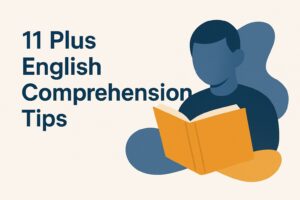
Are 11 Plus Tutors Worth the Money in the UK
Is splurging on an 11 Plus tutor really worth it? As parents, we want the best for our children, especially when it comes to crucial exams that can shape their academic futures. But with so many options and varying costs, it’s hard to know if hiring a tutor is the right choice.
In this article, we’ll explore the ins and outs of the 11 Plus exam, the role tutors play in preparation, and weigh the costs against the potential benefits. Curious if that investment pays off? Let’s dive in!
Overview of the 11 Plus Exam
The 11 Plus exam typically evaluates students on verbal reasoning, non-verbal reasoning, mathematics, and English, influencing the academic journeys of thousands each year. To prepare effectively, students should concentrate on targeted strategies for each section.
For verbal reasoning, utilising resources such as Bond Assessment Papers can significantly enhance vocabulary and comprehension skills.
In mathematics, interactive apps like Mathletics offer exercises that reinforce essential concepts.
Regarding non-verbal reasoning, reviewing past papers from local schools can be beneficial in familiarising students with question formats.
For English, engaging with a diverse range of literature and summarising key themes can sharpen analytical abilities.
Related insight: 11+ Comprehension Tips: How to Help Your Child Succeed in English Exams.
Additionally, regular mock tests are invaluable for helping students build confidence and effectively manage exam-related pressure.
Importance of Academic Support
Academic support has become increasingly important, as research indicates that personalised tutoring can greatly improve student performance, especially in high-stakes exams such as the 11 Plus. A study conducted in 2021 revealed that students who engaged in targeted tutoring saw an average score improvement of 25%.
There are several effective methods to enhance academic support. For instance, one-on-one tutoring sessions can be tailored to focus on specific subjects, and can also be adapted for students with learning needs such as dyslexia. Interactive online platforms like Khan Academy offer additional practice opportunities, while forming study groups can facilitate peer learning and collaboration.
These strategies not only reinforce understanding of the material but also help build confidence, ultimately leading to better examination outcomes.
Understanding the 11 Plus Examination
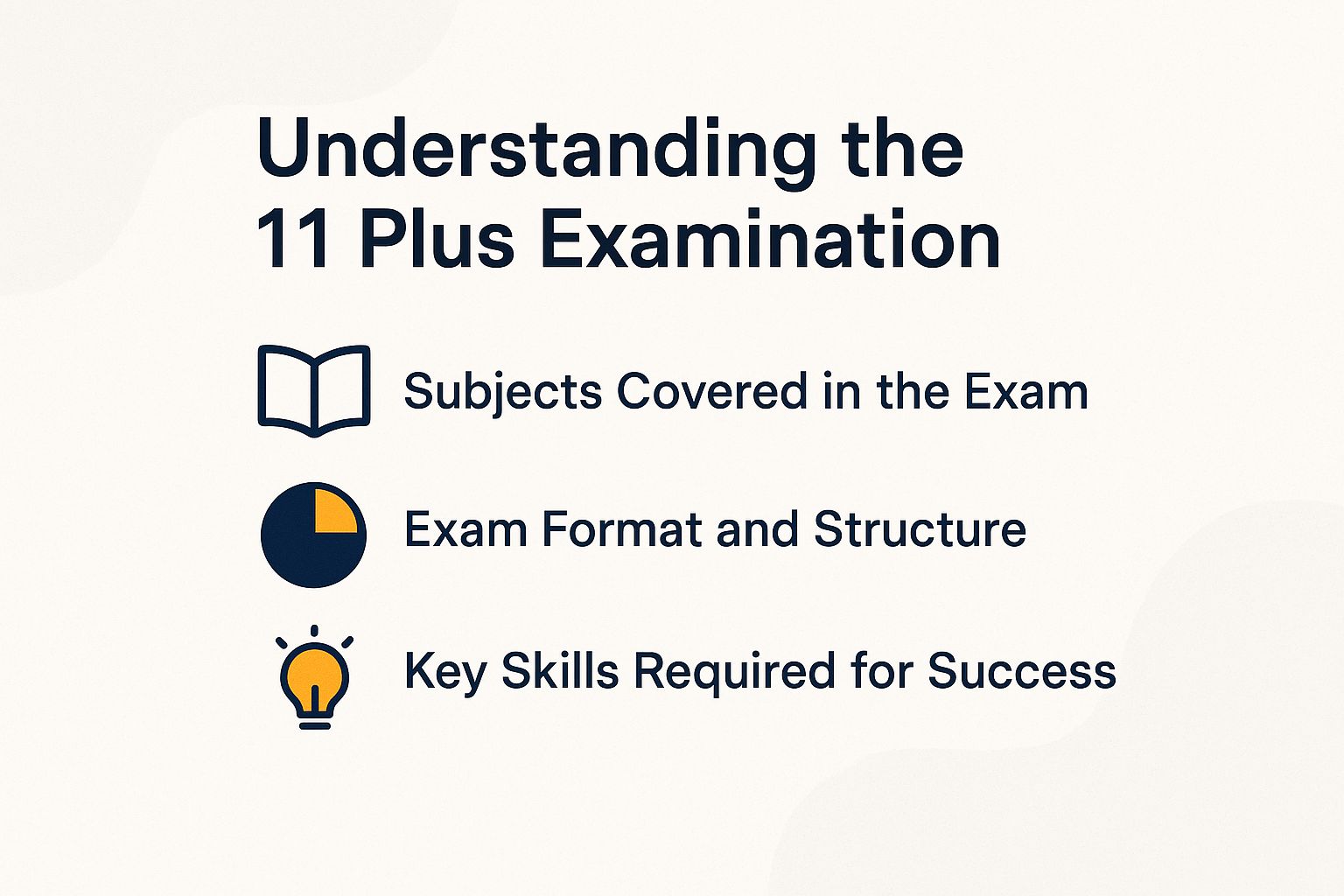
To effectively prepare for the 11 Plus, it is important for both students and parents to understand its structure as well as the skills necessary for success. Familiarising yourself with the subjects covered in the 11 Plus exam is a crucial step in tailoring your study plan.
Subjects Covered in the Exam
The 11 Plus exam encompasses essential subjects, including English, mathematics, verbal reasoning, and non-verbal reasoning, each designed to assess specific academic skills. To achieve success in the 11 Plus, students should concentrate on particular areas of focus.
For English, it is beneficial to practise comprehension and grammar by reading a variety of texts and utilising workbooks such as “Bond 11+ English”. In mathematics, mastering problem-solving techniques and mental arithmetic is vital, and resources like “CGP 11+ Maths” can be quite helpful.
Regarding verbal reasoning, engaging in puzzles and completing practice papers is recommended; websites such as “11 Plus Lifeline” offer excellent resources for this purpose.
Finally, for non-verbal reasoning, working on shape sequences and patterns using tools like “11+ Non-Verbal Reasoning Practice Papers” can significantly enhance performance.
Exam Format and Structure
The 11 Plus exam typically lasts between 1.5 and 2 hours and consists of multiple sections, requiring candidates to showcase their skills under timed conditions. This exam encompasses verbal reasoning, non-verbal reasoning, mathematics, and English, with each section designed to assess different competencies.
Students will encounter a variety of question types, including multiple choice and open-ended questions. In terms of scoring, each section carries a specific weight, and the total score ultimately determines placement into selective schools.
It is advisable for students to practise with past papers and use resources such as Bond or GL Assessment for targeted preparation. Timing each practice session can help them become accustomed to the pressure of the exam conditions.
Key Skills Required for Success
Success in the 11 Plus examination requires more than just academic knowledge; it also necessitates strong critical thinking, time management, and problem-solving skills.
To enhance these essential abilities, one should begin by practising past exam papers, paying particular attention to the types of questions that require critical thinking. Allocating timed sessions for these practice runs can significantly improve time management skills.
Additionally, utilising tools such as Mathletics and Reading Eggs can help reinforce foundational knowledge while also developing effective problem-solving strategies.
It may also be beneficial to join a study group or participate in an online forum where one can engage in discussions about challenging topics with peers. This collaborative approach fosters problem-solving and provides opportunities for regular feedback, helping to identify areas that need improvement and ensuring well-rounded preparation for the exam.
The Role of Tutors in 11 Plus Preparation
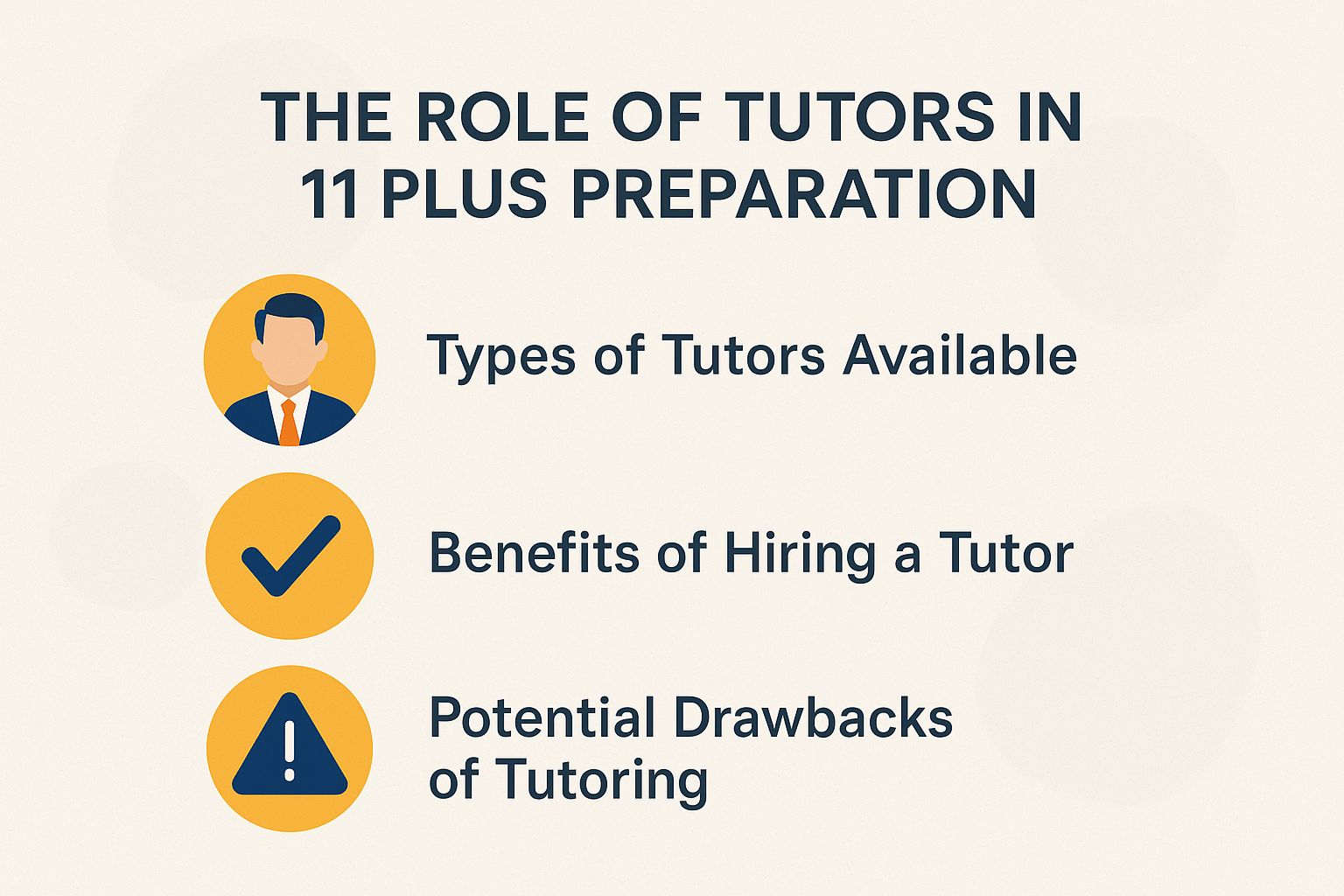
Tutors play a crucial role in preparing students for the 11 Plus by providing personalised instruction that caters to each student’s unique learning needs.
See also: Do I Need an 11 Plus Tutor for My Child—or Can I Do It Myself?
Types of Tutors Available
Parents have a variety of tutoring options to consider, including private one-to-one tutors, group classes, and online tutoring services, each with its own set of advantages.
One-to-one tutors, generally priced between £30 and £100 per hour, offer personalised attention tailored to a student’s specific needs, making them particularly beneficial for those who require focused support.
On the other hand, group classes, which usually range from £15 to £50 per session, encourage peer interaction and can significantly enhance a child’s confidence in a social setting.
For those who prefer the convenience of online options, services like Chegg Tutors and Wyzant provide subscription models or pay-per-session plans, allowing for flexibility and accommodating various budgets across different learning environments.
Ultimately, selecting the right tutoring option should be based on your child’s learning style, goals, and financial considerations.
Benefits of Hiring a Tutor
Hiring a tutor can significantly enhance student performance, as various studies suggest that students who receive tutoring often achieve higher marks and exhibit greater confidence. For example, research conducted by the National Tutoring Association has shown that students who met with a tutor on a weekly basis improved their grades by an average of 1.5 letter grades.
To fully reap these benefits, it is advisable to choose tutors who specialise in the relevant subject area and have a proven track record of success. Platforms like Wyzant and Tutor.com are valuable resources that connect students with qualified tutors tailored to their specific needs.
Additionally, establishing a consistent tutoring schedule and setting clear learning objectives can further enhance the effectiveness of tutoring sessions, creating an environment conducive to ongoing growth and improvement.
Potential Drawbacks of Tutoring
While tutoring offers numerous advantages, it can also pose certain challenges, such as high costs and the possibility of a mismatched dynamic between the tutor and student, which can impact the effectiveness of the learning experience.
To address these concerns, it is advisable to conduct thorough research on potential tutors. Seek out individuals who possess specialised qualifications or have received positive reviews from previous students.
Platforms like Wyzant and Tutor.com provide a variety of tutors, enabling you to compare rates and feedback conveniently. It may also be beneficial to begin with trial sessions to evaluate compatibility before making a long-term commitment.
Effective communication is essential; discussing learning styles and expectations at the outset can help ensure that both parties are aligned.
Additionally, for those seeking more budget-friendly options, local community centres or schools often offer affordable tutoring programmes, which can facilitate the search for a suitable match.
Cost Analysis of 11 Plus Tutors
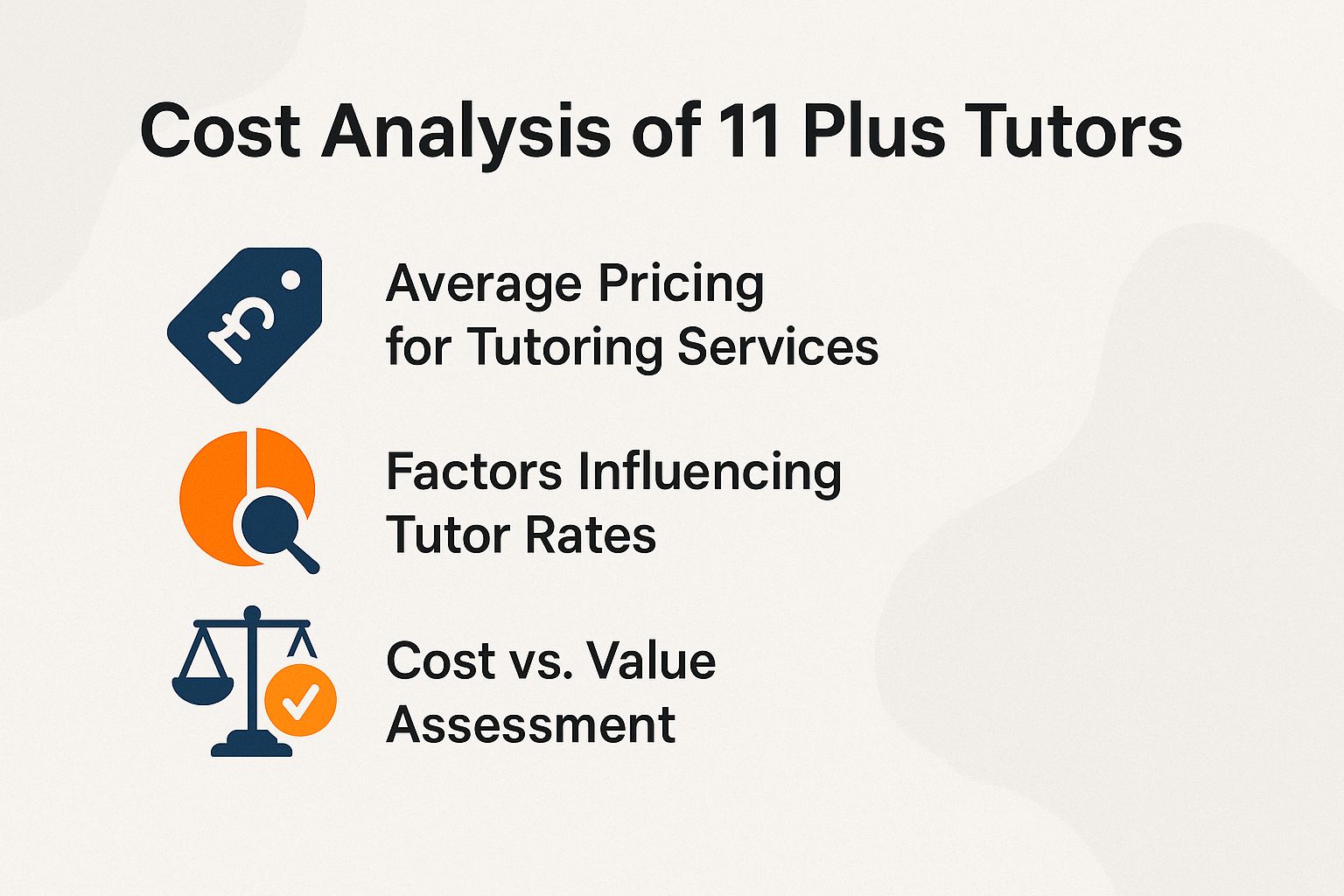
It is essential for parents to understand the costs associated with 11 Plus tutoring in order to make informed decisions about their investment in academic support. For a broader perspective, consider how these costs compare to those of different educational systems, such as grammar schools and private schools, as explored in our detailed analysis of educational institutions.
Average Pricing for Tutoring Services
Typically, 11 Plus tutoring sessions range from £25 to £60 per hour, depending on the tutor’s qualifications and experience. In London, you can expect to pay closer to the higher end, with rates averaging around £50. On the other hand, northern regions like Manchester often see rates around £30, highlighting a significant regional difference.
More experienced tutors may charge upwards of £70 per hour, while newly qualified educators tend to offer rates closer to £25. For parents who are mindful of their budget, considering group tutoring sessions can be a cost-effective option. This approach allows children to receive quality instruction without putting a strain on finances.
Factors Influencing Tutor Rates
Several factors influence tutor rates, including their qualifications, experience, location, and the demand for 11 Plus preparation services. Tutors who are qualified and have specialised training in 11 Plus preparation often command higher fees due to their expertise.
For example, a tutor with a background in education and several years of experience might charge between £40 and £60 per hour.
Location is another significant factor; typically, urban areas tend to have higher rates compared to rural regions. Additionally, if demand spikes during exam seasons, you may notice an increase in rates as well.
It is essential for parents to conduct thorough research and compare rates in their area. They might also want to consider online tutoring as a potentially cost-effective alternative.
Cost vs. Value Assessment
Conducting a cost versus value assessment is an effective way for parents to evaluate the return on investment (ROI) associated with hiring a tutor for 11 Plus preparation.
First, it is important to calculate the total costs involved, which include the tutor’s hourly rate and the number of sessions required. For instance, if a tutor charges £40 per hour and the student needs 15 sessions, the total cost would amount to £600.
Following that, it is essential to assess the potential benefits of tutoring: improved exam results, increased confidence, and a greater likelihood of securing a place at a preferred school. One might consider a scenario where a student’s score increases by 20%, thereby enhancing scholarship eligibility or providing access to a more desirable school.
This analysis not only highlights the monetary ROI but also reveals the longer-term advantages that tutoring can offer.
Success Rates of Students with Tutors
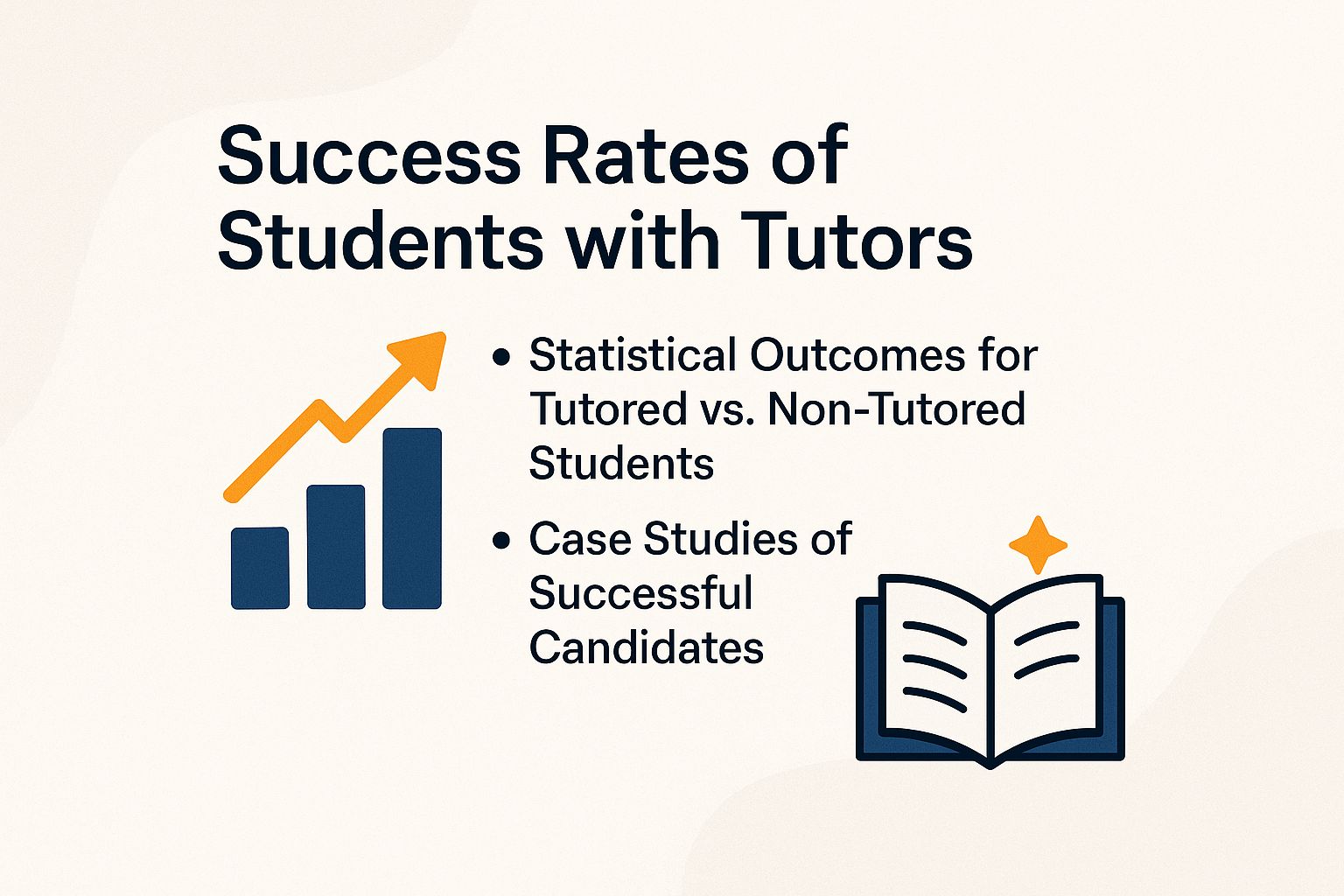
The evidence indicates that students who receive tutoring for the 11 Plus are statistically more likely to pass than their peers who do not receive such support.
Statistical Outcomes for Tutored vs. Non-Tutored Students
Research shows that 75% of students who receive tutoring achieve scores in the top quartile, while only 30% of students who do not receive tutoring reach that level. This significant difference highlights the importance of personalised learning.
For instance, one-to-one tutoring sessions can be customised to target specific areas of weakness, such as algebra or reading comprehension, utilising resources like Khan Academy for skill development.
Additionally, online platforms such as Wyzant or Tutor.com provide flexibility in scheduling and access to subject matter experts, allowing students to find the ideal match for their learning needs.
By actively participating in these tutoring sessions, students not only gain a better understanding of challenging concepts but also build confidence in their academic abilities, leading to improved performance overall.
Case Studies of Successful Candidates
Analysing the journeys of successful 11 Plus candidates allows us to glean valuable insights into effective tutoring strategies and practices.
Take Emma, for instance. She initially struggled with mathematics, but through targeted sessions, she was able to transform her understanding. By concentrating on past exam papers and timed exercises, her confidence grew significantly.
Then there’s Jack, who faced challenges in verbal reasoning. His tutor utilised interactive games that made reinforcing concepts enjoyable, which led to a noticeable improvement in his performance.
Both students clearly demonstrated that personalisation—tailoring methods to align with individual strengths and weaknesses—was crucial to their success. This underscores the importance of adaptive learning in the tutoring process.
Alternatives to Private Tutoring
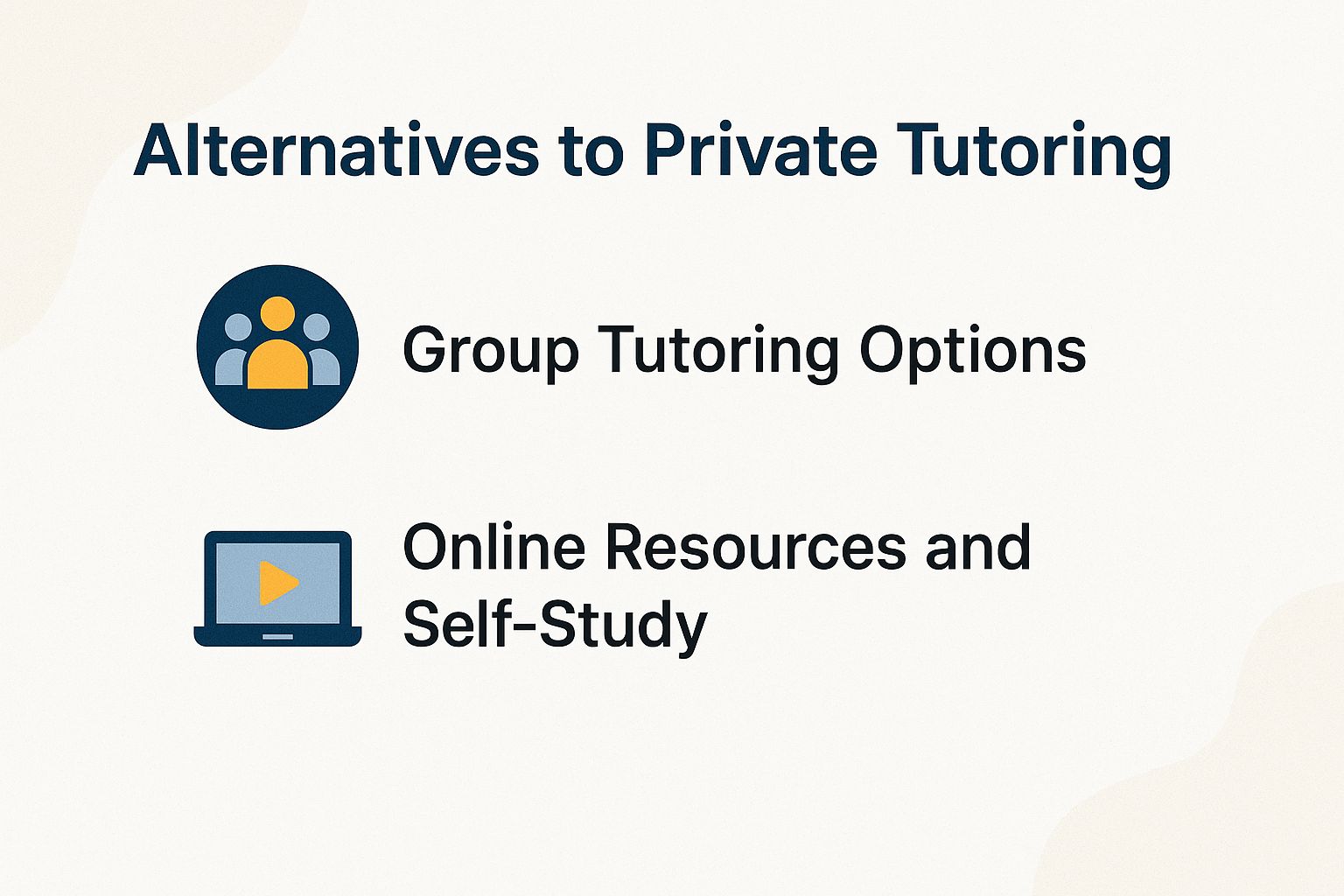
For individuals looking for cost-effective options, there are alternatives to private tuition that can offer valuable assistance in preparing for the 11 Plus examination. One effective method involves exploring resources related to different entrance exams, such as the 7+ entrance exams, which provide insights into exam formats and preparation strategies.
Group Tutoring Options
Group tutoring provides an interactive environment where students can engage in collaborative learning, typically at a lower cost than individual sessions. This format caters to various learning styles and encourages peer-to-peer interaction, enriching the overall educational experience.
For instance, a group of five students might each contribute £30 for a two-hour session, resulting in a total of £150, compared to £75 for a one-to-one lesson. The collaborative nature of group tutoring promotes discussion and problem-solving, often leading to a more profound understanding of the material.
However, there are potential downsides, such as differing skill levels among participants, which may create pacing challenges. Nevertheless, the advantages of shared knowledge and cost-effectiveness frequently outweigh these issues.
Online Resources and Self-Study
With the abundance of online resources available today, students can easily access a wealth of study materials and practice exams to prepare for the 11 Plus independently. To optimise your study strategy, consider utilising the following platforms:
First, Atom Learning offers tailored 11 Plus practice papers and video tutorials, making it a valuable resource.
Next, CGP Books provides comprehensive study guides that are aligned with the exam format, ensuring you are well prepared.
Additionally, BBC Bitesize serves as a fantastic free resource for foundational subjects, perfect for reinforcing key concepts.
Finally, City & & Guilds offers online assessments that simulate real exam conditions, providing an authentic practice experience.
By integrating these resources into a structured study schedule, you can dedicate specific hours each week to practice and review, ensuring consistent progress in your preparation.
Making the Right Choice
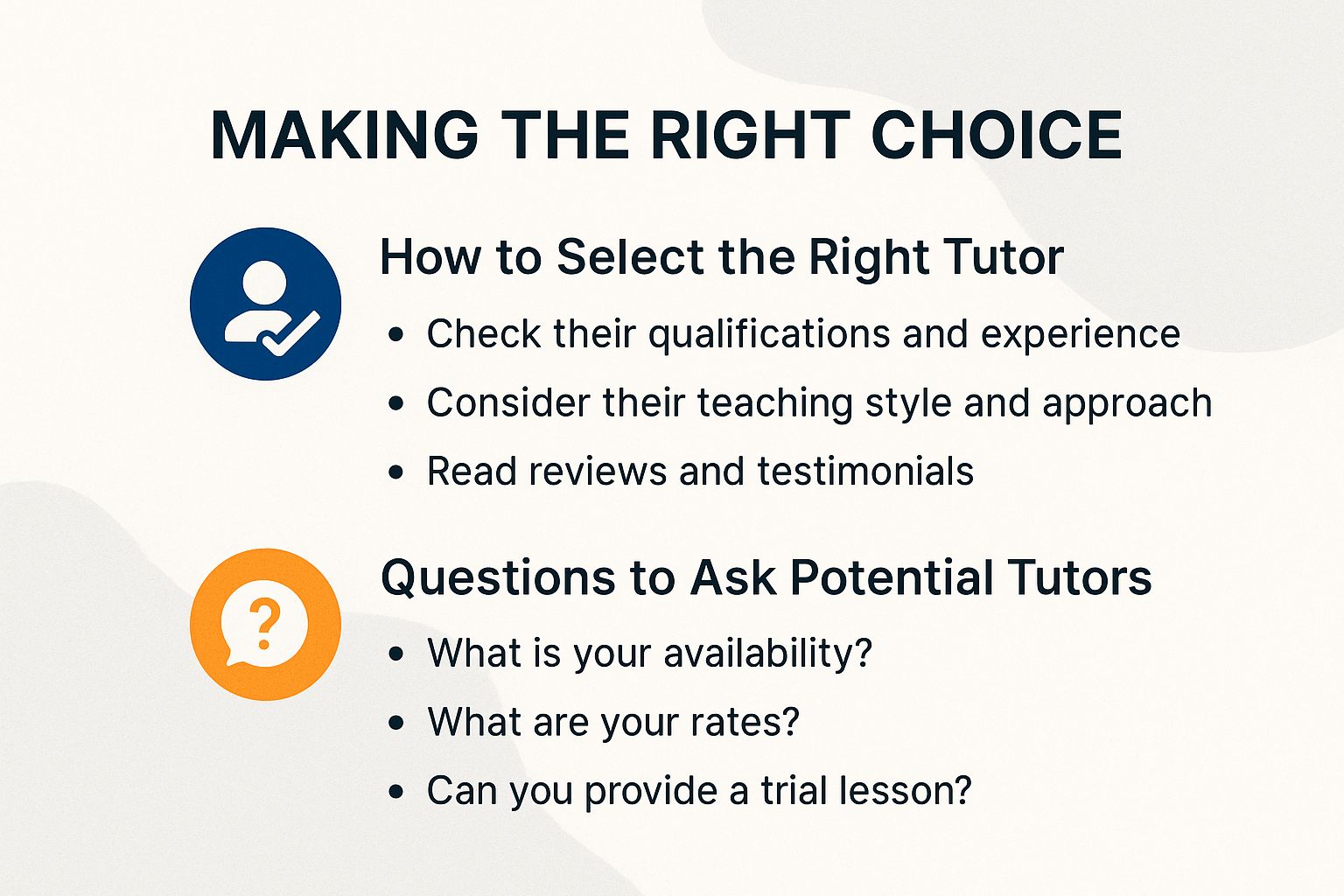
Choosing the right tutor is an essential step in preparing effectively for the 11 Plus exam, as it significantly influences the overall success of the pupil.
How to Select the Right Tutor
When selecting a tutor for 11 Plus preparation, it is important for parents to consider several key factors, including qualifications, teaching style, and the success rates of previous students.
To make this selection process more efficient, creating a checklist can be beneficial.
Start by verifying the tutor’s qualifications and experience; having a background in successfully guiding students through the 11 Plus examinations is essential. Next, assess their teaching style—do they use interactive methods that engage the student? It is helpful to look for testimonials or case studies that showcase the success of former students.
Additionally, consider scheduling a trial session to observe how well the tutor connects with your child. This thorough approach will help ensure that you find the right fit for your child’s unique needs.
Questions to Ask Potential Tutors
Asking the right questions during tutor interviews can provide valuable insights into their teaching effectiveness and compatibility with your child.
Begin by enquiring about their teaching style. For example, you might ask how they adapt lessons to accommodate different learning paces. This will help you assess whether they can meet your child’s unique needs.
It’s also important to explore their experience with specific subjects. Enquire about how long they have been tutoring those subjects. Additionally, examining their approach to homework can be quite revealing; you could ask how they support students while also encouraging independence.
Finally, discuss their availability and preferred communication methods, as these factors are essential for ensuring consistent progress and feedback.
Frequently Asked Questions
1. Are 11 Plus tutors necessary for success in the UK?
It depends on the individual student and their specific needs. Some students may benefit greatly from the one-on-one attention and tailored instruction provided by a tutor, while others may not see a significant difference in their performance.
2. How much should I expect to pay for an 11 Plus tutor in the UK?
The cost of an 11 Plus tutor in the UK can vary greatly depending on the tutor’s qualifications, experience, and location. On average, parents can expect to pay anywhere from £30 to £70 per hour for a tutor.
3. Do all 11 Plus tutors in the UK charge the same rate?
No, the rate for an 11 Plus tutor can vary depending on their qualifications, experience, and location. It’s important to research and compare different tutors to find the best fit for your budget and your child’s needs.
4. Are there any alternatives to hiring an 11 Plus tutor in the UK?
Yes, there are other options for preparing for the 11 Plus exam, such as online courses, study guides, and practice tests. However, these alternatives may not provide the same level of personalised instruction and support as a tutor.
5. Can an 11 Plus tutor guarantee my child’s success on the exam?
No, there is no guaranteed formula for success on the 11 Plus exam. A tutor can provide valuable guidance, resources, and support, but ultimately, a student’s success will depend on their own effort and preparation.
6. Are there any scholarships or financial aid available for 11 Plus tutors in the UK?
Some tutoring companies or organisations may offer scholarships or financial aid for families in need. It’s always worth enquiring about these options when considering hiring a tutor, as it could make it more affordable for your family.


